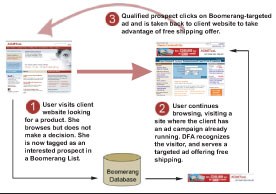Google to tag users across Web: Privacy Boomerang?

Why is Google acquiring DoubleClick?
To give users “better privacy protection,” among other things asserted by Google.
REALLY? Google has actually taken a $3.1 billion step closer to realizing its objective of organizing all the world’s information, the world’s personal information that is.In acquiring DoubleClick, Google will operate the firm’s “Boomerang for Advertisers, Marketers and Agencies” to leverage behavioral targeting, “the most effective form of targeting available, according to DoubleClick.
How DoubleClick's Boomerang works:

2) User continues Web browsing, visiting a site where the client has an ad campaign already running. Dart for Advertisers recognizes the visitor (thanks to the Dart cookie ID), and serves a targeted ad offering free shipping.
3) Qualified prospect clicks on Boomerang-targeted ad and is taken back to client Website to take advantage of free shipping offer.
Google has famously not accepted third party ad tags under the guise that “we don’t do anything to compromise the user experience on Google properties or across our AdSense network.”In its Google Speak FAQ on its DoubleClick transaction, however, Google says:
We did not accept third party tags because we could not guarantee the quality of the ad or that it would comply with our format policies. (BUT) working with DoubleClick we will increase the relevance of ads online so that we maintain a positive user experience while providing targeted ad opportunities for advertisers and increased monetization for publishers.
What are some of the ways Google might “increase the relevance of ads online” by working with DoubleClick?
Google acquires a DoubleClick “sketchy reputation,” according to Weinstein:The ability to correlate information about third-party sites collected using DoubleClick technology, particularly cookies, with search history and other information gathered by Google would be extremely powerful, and potentially very attractive as a marketing tool (and) would significantly increase the amount of data that could be aggregated about any given individual, Lauren Weinstein, California Initiative for Internet Privacy, is cited by CIO Today.
From the start DoubleClick has been the poster boy for third-party cookies, and when they started pulling information from widely ranging sources and compiling in it in a central database, they helped drive the opposition to cookies. There are entire Web sites devoted just to blocking DoubleClick ads.
When DoubleClick ads become Google ads will there be a privacy Boomerang?
ALSO: Google DoubleClick merger: Who wins, who loses and Google DoubleClick marriage (can be) risky business and Google hurts Yahoo with DoubleClick deal and Google: $3.1 billion cash for Web monopoly! and Microsoft vs. Google: Will MSN, Windows Live compete?